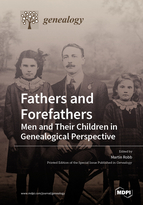Fathers and Forefathers: Men and Their Children in Genealogical Perspective
A special issue of Genealogy (ISSN 2313-5778).
Deadline for manuscript submissions: closed (30 December 2019) | Viewed by 34172
Special Issue Editor
Special Issue Information
Dear Colleagues,
Research on fathers and fatherhood has blossomed in recent years, with a number of groundbreaking studies appearing, for the most part illuminating present-day fathering experiences (e.g., Doucet, 2006; Dermott, E. 2008; Miller, T., 2011), but also beginning to uncover hidden narratives of past fatherhoods (e.g., Tosh, 2007; King, 2015). This special issue will, we hope, add something new to this expanding field, by exploring the dynamic relationship between present and past fatherhoods.
Family history and genealogical studies can be said to have an inbuilt masculine bias, due in part to the emphasis on tracing ancestors via surnames, which certainly in the Anglophone world has usually meant the name of the father, and in part because until comparatively recently women were mostly invisible in historical documentation. However, this apparent paternalist bias can obscure not just the lives of mothers, but also diverse and overlooked experiences of fatherhood in the past.
Popular understandings of fathers in past generations, as being detached and uninvolved in the lives of their children, can be said to play a significant part in the construction of modern fathering identities, with many men defining themselves in opposition to the way they recall being fathered, and ideas of ‘new’ fatherhood being played off against mythicized notions of historical fathering practices. But historical research has begun to show that these popular myths often misremember the past, judging it by current standards, and obscure the diverse nature of fathering practices in the recent and historical past, as well as globally and interculturally.
A genealogical approach to the study of fathers and fatherhood can critically examine these intergenerational constructions of fatherhood, and more positively illuminate the ways in which experiences of fathering and being fathered are passed on between generations. As Philip Kretsedemas wrote in the editorial to the inaugural issue of this journal, ‘genealogies can operate as a method for tracing pathways that unravel the definitions we impose on things and for exposing the limitations of familiar narratives’ (Kretsedemas, 2017).
For this special issue, we invite contributions that use a genealogical approach (broadly defined) to fathering and fatherhood, to defamiliarise accepted narratives and suggest new ways of thinking about men and their relationships with their children. Papers are invited from any relevant disciplinary backgrounds, addressing but not limited to the topics listed below:
Memories and memoirs of fathering and being fathered
Fathers in family stories and myths
Intergenerational influences on fathering
The name of the father: patrilinear bias in family history
Hidden, forgotten or marginalised narratives of fatherhod
Images of past fatherhoods in fiction and on film
Different and diverse past fatherhoods
Father figures and role models
Case studies of fathers and father figures from family history research
Past fatherhoods shaping present-day fathering
The construction of fatherhood in family and historical documents
References
Dermott, E (2008), Intimate Fatherhood: a sociological analysis, Routledge
Doucet, A. (2006 ) Do Men Mother? Fathering, care and domestic responsibility, University of Toronto Press
King, L. (2015) Family Men: Fatherhood and Masculinity in Britain, 1914-1960, Oxford University Press
Kretsedemas, P. (2017) ‘What Is Genealogy? Introduction to the Inaugural Issue of Genealogy’, Genealogy 1(2), 10
Miller, T. (2011) Making Sense of Fatherhood: Gender, caring and work, Cambridge University Press
Tosh, J. (2007) A Man's Place: Masculinity and the Middle-class Home in Victorian England, Yale University Press
Dr. Martin Robb
Guest Editor
Manuscript Submission Information
Manuscripts should be submitted online at www.mdpi.com by registering and logging in to this website. Once you are registered, click here to go to the submission form. Manuscripts can be submitted until the deadline. All submissions that pass pre-check are peer-reviewed. Accepted papers will be published continuously in the journal (as soon as accepted) and will be listed together on the special issue website. Research articles, review articles as well as short communications are invited. For planned papers, a title and short abstract (about 100 words) can be sent to the Editorial Office for announcement on this website.
Submitted manuscripts should not have been published previously, nor be under consideration for publication elsewhere (except conference proceedings papers). All manuscripts are thoroughly refereed through a double-blind peer-review process. A guide for authors and other relevant information for submission of manuscripts is available on the Instructions for Authors page. Genealogy is an international peer-reviewed open access quarterly journal published by MDPI.
Please visit the Instructions for Authors page before submitting a manuscript. The Article Processing Charge (APC) for publication in this open access journal is 1400 CHF (Swiss Francs). Submitted papers should be well formatted and use good English. Authors may use MDPI's English editing service prior to publication or during author revisions.
Keywords
- fathers
- masculinity
- identity
- intergenerational






